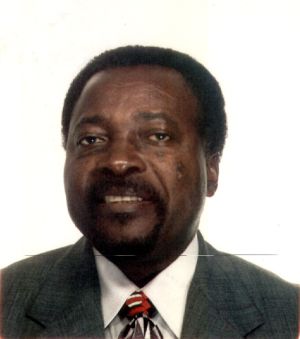Related Research Articles

Equatorial Guinea, officially the Republic of Equatorial Guinea, is a country on the west coast of Central Africa, with an area of 28,000 square kilometres (11,000 sq mi). Formerly the colony of Spanish Guinea, its post-independence name refers to its location near both the Equator and in the African region of Guinea. As of 2021, the country had a population of 1,468,777, over 85% of whom are members of the Fang people, the country's dominant ethnic group. The Bubi people, indigenous to Bioko, are the second largest group at approximately 6.5% of the population.

Malabo is the capital of Equatorial Guinea and the province of Bioko Norte. It is located on the north coast of the island of Bioko. In 2018, the city had a population of approximately 297,000 inhabitants.
The Lengue language, also called Molengue, Balengue, Molendji, is a Bantu language of southern Equatorial Guinea, spoken by the Lengue people between Bata and the Gabon border near the coast. The speakers have come under increasing Fang influence. The Ethnologue describes it as a member of the B subgroup of Northwest Bantu, while Echegaray is more specific, saying that it is linguistically a member of the Sheke group :

The Equatorial Guinea national football team represents Equatorial Guinea in men's international football and is controlled by the Equatoguinean Football Federation, a member of the Confederation of African Football (CAF).

Equatorial Guinea elects on the national level a head of state – the president – and a legislature. The president is elected for a seven-year term by the people. President Teodoro Obiang Nguema Mbasogo was re-elected unopposed on 15 December 2002. The Chamber of People's Representatives has 100 members, elected for a five-year term by proportional representation in multi-member constituencies.

The Fang people, also known as Fãn or Pahouin, are a Bantu ethnic group found in Equatorial Guinea, northern Gabon, and southern Cameroon. Representing about 85% of the total population of Equatorial Guinea, concentrated in the Río Muni region, the Fang people are its largest ethnic group. The Fang are also the largest ethnic group in Gabon, making up about a quarter of the population.

Annobón is a province of Equatorial Guinea. The province consists of the island of Annobón and its associated islets in the Gulf of Guinea. Annobón is the smallest province of Equatorial Guinea in both area and population. According to the 2015 census, Annobón had 5,314 inhabitants, a small population increase from the 5,008 registered by the 2001 census. The official language is Spanish but most of the inhabitants speak a creole form of Portuguese. The island's main industries are fishing and forestry.

The Constitution of Equatorial Guinea is the basic document of that country. It was approved in 1991 and amended in 1995. In 2011, a referendum was held on a series of constitutional amendments.

The Portuguese-speaking African countries, also known as Lusophone Africa, consist of six African countries in which the Portuguese language is an official language: Angola, Cape Verde, Guinea-Bissau, Mozambique, São Tomé and Príncipe and, since 2011, Equatorial Guinea. The six countries are former colonies of the Portuguese Empire. From 1778 until independence, Equatorial Guinea was also a colony of the Spanish Empire.

The Equatoguinean Football Federation is the governing body of football in Equatorial Guinea. It was founded in 1975, and affiliated to FIFA and to CAF in 1986. It organizes the national football league and the national team, as well as the women's national team and the national futsal team.

The national coat of arms of Equatorial Guinea was adopted on 21 August 1979.

Equatorial Guinea is a Christian majority country, with Islam being a minority religion. Due to the secular nature of the country's constitution, Muslims are free to proselytize and build places of worship in the country.

Leandro Mbomio Nsue Edú-Aguong was an Equatorial Guinean sculptor and artist, and former minister of Education and minister of information, tourism, art and culture.
Emancipado was a term used for an African-descended social-political demographic within the population of Spanish Guinea that existed in the early to mid 1900s. This segment of the native population had become assimilated into the former European society of Spanish Guinea which primarily existed along the coastline communities of the continental part of the country, as well as on the islands of Bioko and Annobón.
The Museum of Modern Art is a museum in New York City, US.
Téclaire Bille Esono was an Equatoguinean footballer. She played at a club level for Bellas Artes, and for the Equatorial Guinea women's national football team.

The Ministry of Foreign Affairs, International Cooperation, and Francophone Affairs is a ministry of the Government of Equatorial Guinea. The current minister is Simeón Oyono Esono Angue, appointed in 2018.
Sinforosa Eyang Nguema Nchama, also known as Mirey and La Mirey de Fifi, is an Equatoguinean singer and football manager and former player who coaches Huracanes FC in the Equatoguinean women's league.
Capital punishment is no longer a legal punishment in Equatorial Guinea.
References
- ↑ "Museum of Modern Art Equatorial Guinea". Artfacts. Retrieved 15 August 2014.